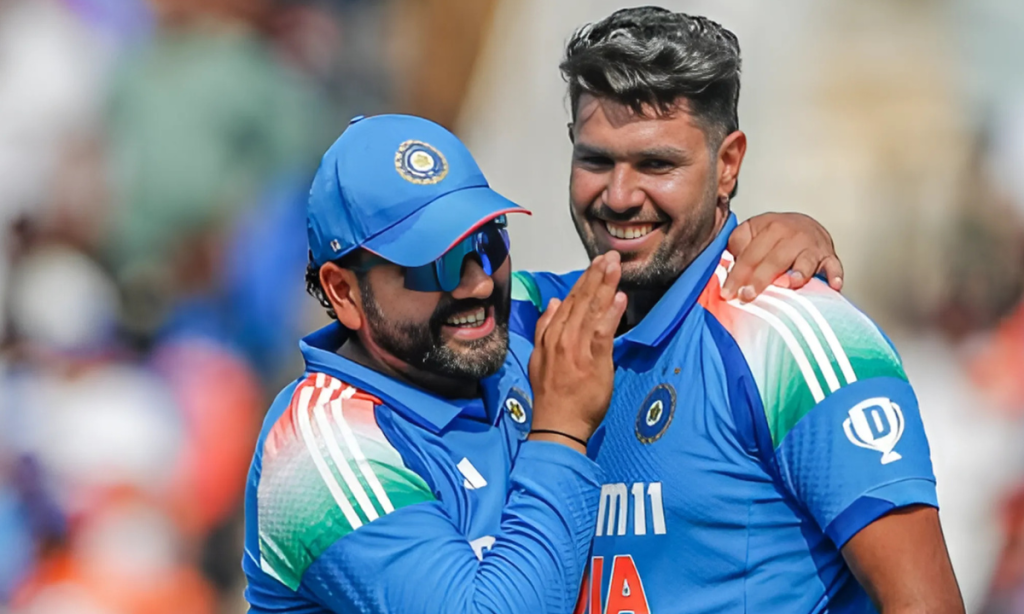Cricket, a game of both finesse and fervor, often witnesses moments where passion oversteps the boundary of strategy.
Such was the case during a recent international match where Rohit Sharma, the Indian cricket team’s captain, felt compelled to admonish one of his bowlers, Harshit Rana.
It was a scene that unfolded on the fifth ball of the 31st over when Rana, in a moment of what might be called a ‘brain fade’, decided to throw the ball at the stumps in an attempt to run out Jos Buttler, who was marginally out of his crease.
The Misjudgment
Buttler, aware of his position, was quick to return to safety, but the ball from Rana, instead of hitting the stumps, sailed past, allowing Buttler to gain four extra runs via an overthrow.
This incident was not just about the runs; it was about the lapse in judgment at a crucial juncture of the match.
KL Rahul, the wicket-keeper, had no chance to recover the situation as the ball raced to the boundary.
Rohit Sharma’s Reaction
Rohit Sharma, standing at mid-on, did not hold back his displeasure.
Known for his calm demeanor, this moment saw him in a different light, as he vocally reprimanded Rana with the words, “Dimag kidhar hai tera?” (Where is your mind?).
This wasn’t just a captain correcting a player; it was a mentor trying to instill discipline and focus in a young bowler under the pressure of international cricket.
The Aftermath
Harshit Rana, visibly affected, walked back to his mark without acknowledging his captain, perhaps reflecting on the moment of folly.
It’s these instances that test the mettle of young players. Fortunately for Rana and India, the mistake did not prove too costly.
Jos Buttler, despite adding 27 runs to his tally, was dismissed by Hardik Pandya in the 39th over, somewhat balancing the scales.
Rohit Sharma to Harshit Rana : “dimag hai ki nahi tere pass” 😂
pic.twitter.com/Lq7FounhRD— Kuljot (@Ro45Kuljot) February 9, 2025
This episode is rich with lessons for both players and fans. For Rana, it’s a reminder that aggression needs to be channeled correctly and that every action on the field has consequences.
For Rohit, it’s a moment to showcase leadership, not just in tactics but in managing human elements under his command. For the team, it’s about unity and learning from each other’s mistakes.
The Role of Experience
Rohit Sharma, with his years of experience, understands the thin line between aggressive play and unnecessary aggression.
His reaction wasn’t just about the four runs; it was about maintaining the discipline that defines top-tier cricket. His role is not only to lead by example but also to ensure his team stays on course, especially when the pressure mounts.
Impact on Team Dynamics
Such incidents can either fracture or strengthen team dynamics.
In this case, it’s likely to serve as a learning curve.
The message from Rohit was clear: focus on the game, not on momentary victories that might backfire.
It’s these teachings that can transform an individual player’s performance and, by extension, the team’s overall strategy and morale.
Looking Forward
Harshit Rana, like many young cricketers, is at a stage where learning from mistakes is part of the journey to greatness.
His response to this reprimand, both in the immediate game and in his future performances, will be telling.
If taken in stride, this could be the moment that defines his career, teaching him the balance between aggression and control, between passion and precision.
In Summary
The incident involving Harshit Rana and Rohit Sharma is more than just a match highlight; it’s a narrative on growth, mentorship, and the unending learning curve of cricket.
As India continues its cricketing journey, moments like these will be remembered not just for the runs scored or given away but for the lessons learned and the spirit of the game that transcends the scoreboard.
Cricket, after all, is as much about character as it is about cricketing skill, and this episode adds another chapter to the rich tapestry of Indian cricket’s history.

